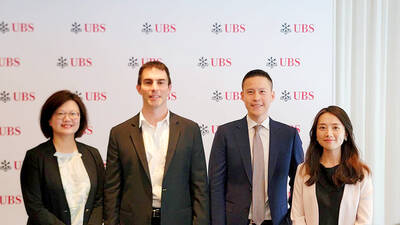PC maker Acer Inc’s (宏碁) telecom solutions unit Acer Octon Inc (宏碁通信) is expected to announce a new Chinese customer at the China International Cloud Computing Expo — to be held from April 10 to April 12 in Chongqing.
Acer Octon general manager James Sha (沙舟) told a news conference that the new customer is a large-scale Chinese enterprise that is not a telecom operator.
The company is also in talks with one of the top three telecom carriers in the US, along with other wireless carriers, banks and hospitals in Japan, Europe and Southeast Asia, aiming to persuade them to adopt the company’s telephone network solutions, Sha said. He declined to name any of the potential customers.
He added that Acer Octon plans to unveil a new terminal switch device — which can be used in telephone networks — at Acer’s annual press conference on April 23 in New York. The new gadget can also be used for smart buildings, such as in home security devices or walkie-talkie systems.
Acer teamed up with Octon in October last year to create affordable telephone network solutions mostly aimed at small and medium-sized enterprises, as part of the company’s efforts to expand its business reach beyond the sagging global PC industry.
One of Acer Octon’s new products is a global communications network for businesses based on Internet Protocol communication, which is known as the abPBX plus series. The company says it integrates traditional telephone systems and desk phones with smartphones, tablets and other mobile devices to offer greater efficiency and reduced costs.
Another product is a minicomputer called the aBeing One, uses Acer Open Platform software to act as an intelligent hub, enabling users to share files or control devices running on different operating systems, according to Acer Octon.

TECH TITAN: Pandemic-era demand for semiconductors turbocharged the nation’s GDP per capita to surpass South Korea’s, but it still remains half that of Singapore Taiwan is set to surpass South Korea this year in terms of wealth for the first time in more than two decades, marking a shift in Asia’s economic ranks made possible by the ascent of Taiwan Semiconductor Manufacturing Co (TSMC, 台積電). According to the latest forecasts released on Thursday by the central bank, Taiwan’s GDP is expected to expand 4.55 percent this year, a further upward revision from the 4.45 percent estimate made by the statistics bureau last month. The growth trajectory puts Taiwan on track to exceed South Korea’s GDP per capita — a key measure of living standards — a

Samsung Electronics Co shares jumped 4.47 percent yesterday after reports it has won approval from Nvidia Corp for the use of advanced high-bandwidth memory (HBM) chips, which marks a breakthrough for the South Korean technology leader. The stock closed at 83,500 won in Seoul, the highest since July 31 last year. Yesterday’s gain comes after local media, including the Korea Economic Daily, reported that Samsung’s 12-layer HBM3E product recently passed Nvidia’s qualification tests. That clears the components for use in the artificial intelligence (AI) accelerators essential to the training of AI models from ChatGPT to DeepSeek (深度求索), and finally allows Samsung

READY TO HELP: Should TSMC require assistance, the government would fully cooperate in helping to speed up the establishment of the Chiayi plant, an official said Taiwan Semiconductor Manufacturing Co (TSMC, 台積電) yesterday said its investment plans in Taiwan are “unchanged” amid speculation that the chipmaker might have suspended construction work on its second chip packaging plant in Chiayi County and plans to move equipment arranged for the plant to the US. The Chinese-language Economic Daily News reported earlier yesterday that TSMC had halted the construction of the chip packaging plant, which was scheduled to be completed next year and begin mass production in 2028. TSMC did not directly address whether construction of the plant had halted, but said its investment plans in Taiwan remain “unchanged.” The chipmaker started

LOOKING BRIGHT: Taiwanese tech stocks have been trading at 18 to 19 times earnings, beating the 15 percent long-term average amid AI-driven optimism, an analyst said Taiwan’s economy could expand by as much as 5 percent this year, fueled by its technology manufacturing edge amid a global artificial intelligence (AI) boom, while tariff exemptions on semiconductor products keep the country’s levy burden low despite a headline rate of 20 percent, UBS Investment Bank said yesterday. “Although Washington has imposed a 20 percent tariff on goods from Taiwan, exemptions for semiconductors keep the weighted average low,” UBS senior economist for Asia and China William Deng (鄧維慎) said. The growth momentum is expected to extend into next year, with technology companies’ revenue projected to rise 17 percent, UBS research head